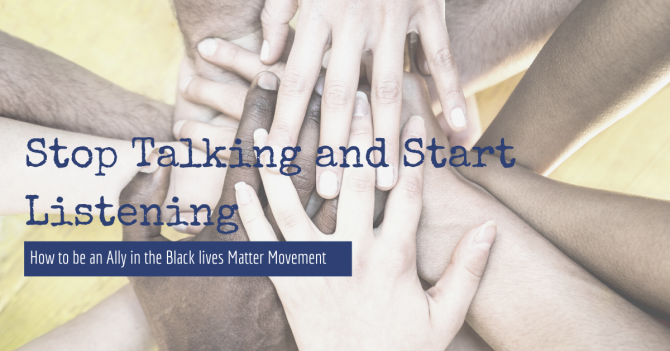
The recent death of George Floyd has sparked a national outrage over systemic racism and oppression. Facing racism and violence is nothing new for the Black communities in Canada or the United States. However, non-black individuals haven’t always been vocal enough in holding their family and friends, institutions, and even themselves accountable when combatting oppression.
Right now is the time to show the Black people in our community our solidarity and support. We need to listen, we need to learn, and we need to act. Black people should not have to fight this battle alone. This is a movement that needs all of us.
Many Non-Black individuals want to stand in solidarity with the Black Lives Matter Movement but are not sure how. Here are some ways that you can start:
- Recognize your privilege
- Confronting your privilege can be very awkward and uncomfortable. However, it is truly a privilege in itself to be learning about racism rather than to experience it yourself. It is important to acknowledge that your success is due partly to your privilege.
- Here is a video explaining how systemic racism contributes to privilege.
- Educate yourself
- Racism is ingrained in our everyday lives - our government, policing systems, curriculum, and even ourselves. This movement requires constant learning and education from each other. Markham Public Libraries offers plenty of biographies, movies, and documentaries that Black people have put their thoughts, voices, and efforts behind that can help you educate yourself.
-
Let's reflect and educate ourselves as we stand for the Black community. Unsure where to begin? Here are some books to get you started!
-
Talking to your children about Racism can be a difficult conversation. Here are some books to help get them thinking about it!
- Films:
- 13th (2016)
- I am Not Your Negro (2017)
- Hidden Colours (2012)
- Fruitvale Station (2013)
- If Beale Street Could Talk (2018)
- Selma (2015)
-
-
Check in on your Black loved ones
- It feels like a crucial time to check in with your Black loved ones, coworkers, and neighbours. Black individuals are going through a lot of stress right now, trying to process everything that is happening. While it does seem very well intended to check in and ask how they are doing, it is also important to ask yourself, “Are you prepared to provide real support?”, “What are you doing to help the movement?”, “What can you say besides, Hey, how are you?” It is very apparent that they are going through an extremely difficult time and a simple, “How are you?” may not help their situation. Instead, try asking, “How can I support you right now?” or “Have you been able to sleep well lately?” which can be more meaningful. Follow this tweet thread to read more ideas.
-
Donate to and support Black Lives Matter (BLM) funds and initiatives
- If you are able, financial contributions to the movement can be extremely helpful in enacting change. However, if you do not have the means to donate money, there are still ways to help. Signing petitions, emailing police officials, using your online platform to raise awareness, and to amplify the Black voices that are not being heard at this time are ways that you can support the movement.
- Some petitions to sign:
- Some organizations to donate to:
- Black Lives Matter
- The Bail Project
- Color of Change
- Communities United Against Police Brutality
- Campaign Zero
- Reclaim the Block
- Black Visions Collective
- NAACP Legal Defense Fund
-
Speak out against racism
- Every day, people of colour experience micro aggressions. Micro aggressions are subtle, everyday forms of communications that transmit negative, hostile or derogatory insults toward a marginalized group. This is often unintentional but has been deeply rooted in the culture of our society. Examples of micro aggressions include asking someone where they are from or complimenting their English ability despite of the fact they have been born and raised in Canada - while this seems very harmless it gives an underlying message that, “You do not belong here, you are a foreigner.” Another example, someone clutching their purse or checking for their wallet as a Black or Latinx person walks by or a store owner following a person of colour around their store. Through these actions, the person is told they are a criminal, they are dangerous, they do not belong here. Recognizing these forms of everyday discrimination, and speaking out against them by holding people accountable for these seemingly harmless actions can help us with moving forward and supporting this movement.
Racism is a fortress - its designed for the protection of some individuals while keepings others out, exposed to all the harms and dangers that lay outside of it. If you want to enact change, you must leave that fortress, so to speak; you must put in the work to step outside and deconstruct it. This process may be very uncomfortable but it is non-negotiable. Understanding the ways that you have benefitted from systemic racism can be intimidating at first but it is necessary in moving forward and being the change we want to see.


Add a comment to: Stop Talking and Start Listening – How to be an Ally in this Movement